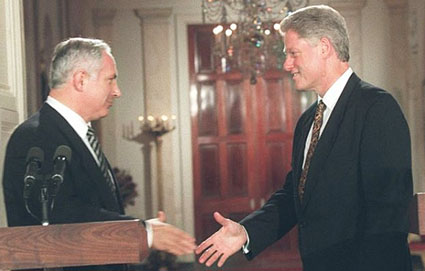by WorldTribune Staff, April 12, 2023
In an excerpt from his book, “Bibi: My story“, Israeli Prime Minister Benjamin Netanyahu recalled his first meeting with Bill Clinton and his subsequent all-out effort to engineer Netanyahu’s defeat against the favored Labor Party Candidate Shimon Peres in 1996:
[Bill and Hillary Clinton asked that I] “brief them both” on the situation in the Middle East. I made a mental note of the “both.” (I don’t think I’ll detract anything from their interest in the region by saying that they were probably curious to hear my briefing because of my standing with Jewish and non-Jewish Americans.)
I saw Clinton again during the signing of the peace treaty with Jordan in Israel’s Arava Valley in 1995. That year, I also sent him my third book on terrorism, Fighting Terrorism, and he sent me back a cordial letter. Notwithstanding his civility, I knew his administration would do anything to defeat me. In fact they did.
Totally committed to the idea of a fully independent Palestine, they were not aware that Rabin himself had been opposed to such a state. Clinton sent his number one campaign strategist, James Carville, his pollster Stan Greenberg and his top team of experts to Israel to help tip the scales in Peres’s favor. Special envoy Dennis Ross would later say, “We did everything we could to help Peres,” and Clinton’s national security advisor, Sandy Berger, would also later admit, “If there was ever a time that we tried to influence an Israeli election, it was Peres vs. Netanyahu.”
Normally such an outrageous and systemic interference in another democracy’s elections would elicit outcries of protest from the press in America and Israel alike. No such protests were heard. Totally supportive of Peres, the press in both Israel and the United States was silent.
Though the odds were stacked against us, we weren’t fazed. “About Carville,” Arthur [Finkelstein] said, “we can beat him.” Clinton and Peres organized an international peace conference in Sharm el-Sheikh a few weeks before the elections. Peres, Clinton, President Hosni Mubarak of Egypt, King Hussein of Jordan, and Arafat all showed up and danced the dance. Yet a few months earlier, soon after Peres was installed without an election as replacement prime minister following Rabin’s assassination, King Hussein had sent me a message through his brother Crown Prince Hassan, asking: Would I meet Hassan secretly in London?
In a London flat the crown prince and I hit it off immediately. I liked Hassan. Straightforward, with a humorous streak, he didn’t even attempt to hide his concern about a Peres victory. Though they wouldn’t admit it publicly, he and many Jordanian officials I met over the years were concerned that an armed Palestinian state could destroy the Hashemite regime and take over Jordan.
Since suicide bombers kept exploding themselves in their midst, few Israeli voters were swayed by the grand convocation for peace in Sharm el-Sheikh. Yet while the gap between Peres and me had shrunk, it was still a substantial 10 percent difference. Everything was up to the television debate scheduled a few days before the elections. Arthur crossed his fingers that Peres would agree to do it. He did. ….
Among the first to call and congratulate me on my election victory was President Clinton. “Bibi, I’ve got to hand it to you.” He chuckled. “We did everything we could to bring you down, but you beat us fair and square.” Quintessential Bill, I thought. He wasn’t telling me something I didn’t know, but here was the president of the United States admitting without batting an eyelash to a brazen intervention in another country’s elections.
Membership . . . . Intelligence . . . . Publish
